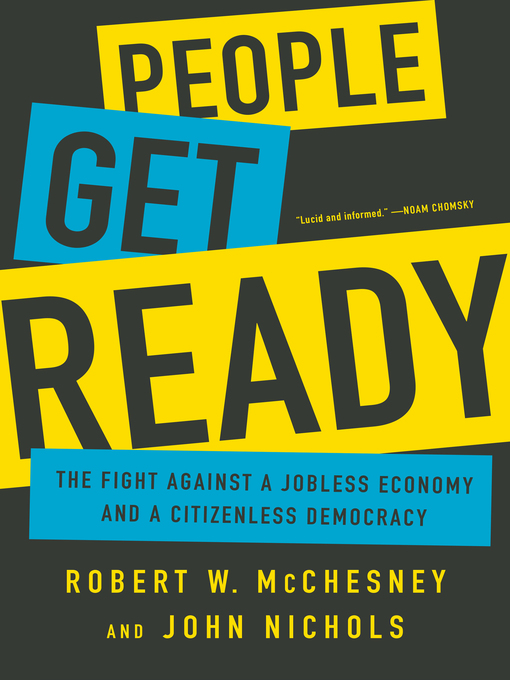People Get Ready
The Fight Against a Jobless Economy and a Citizenless Democracy
The consequences of the technological revolution are about to hit hard: unemployment will spike as new technologies replace labor in the manufacturing, service, and professional sectors of an economy that is already struggling. The end of work as we know it will hit at the worst moment imaginable: as capitalism fosters permanent stagnation, when the labor market is in decrepit shape, with declining wages, expanding poverty, and scorching inequality. Only the dramatic democratization of our economy can address the existential challenges we now face. Yet, the US political process is so dominated by billionaires and corporate special interests, by corruption and monopoly, that it stymies not just democracy but progress.
The great challenge of these times is to ensure that the tremendous benefits of technological progress are employed to serve the whole of humanity, rather than to enrich the wealthy few. Robert W. McChesney and John Nichols argue that the United States needs a new economy in which revolutionary technologies are applied to effectively address environmental and social problems and used to rejuvenate and extend democratic institutions. Based on intense reporting, rich historical analysis, and deep understanding of the technological and social changes that are unfolding, they propose a bold strategy for democratizing our digital destiny — before it's too late — and unleashing the real power of the Internet, and of humanity.
-
Creators
-
Publisher
-
Release date
March 8, 2016 -
Formats
-
Kindle Book
-
OverDrive Read
- ISBN: 9781568585222
- File size: 4315 KB
-
EPUB ebook
- ISBN: 9781568585222
- File size: 4385 KB
-
-
Languages
- English
-
Reviews
-
Publisher's Weekly
January 4, 2016
In a stirring call to arms, McChesney (Blowing the Roof off the Twenty-First Century) and Nichols (The S Word) argue that although the digital revolution has been world-shaking and ruthlessly efficient, it has fallen short of ushering in the utopia some have predicted, because the ability to determine the future has been concentrated among just a few powerful people. Global automation and dislocation—the result of which is that a tiny fraction of the workforce once needed can now complete the same amount of work—will soon lead to unemployment of a startling magnitude. No one has a plan to resolve this looming so-called jobless economy, not even the big tech companies that helped create the situation. Moreover, the authors find that historically, the U.S. government does not take action until faced with catastrophe. McChesney and Nichols warn of a “citizen-
less democracy,” in which politicians pander only to the needs of a few wealthy donors, leaving the majority in the dust and excluding them from the process of worldbuilding. This necessary if unsettling read is not an attack on tech, but on dangerous, unchecked capitalism. -
Kirkus
February 1, 2016
An energetic if grim discussion of inequality and the coming era of underemployment, viewed through the lens of the forgotten American progressive narrative. McChesney (Communications/Univ. of Illinois; Digital Disconnect: How Capitalism is Turning the Internet Against Democracy, 2013, etc.) and Nation Washington, D.C., correspondent Nichols bring clear urgency to this sprawling polemic, which encompasses politics, the cybereconomy, the decline of critical journalism, and historical movements beginning with America's founding. They describe the post-2008 recession era as a "maelstrom" of inequity, pointing toward worse times in the labor market: "the debate about where technological change is headed is already settled in the circles of those who intend to profit from that change." This pessimism is linked to what the authors convincingly portray as the decay of representative governance. Both parties, they argue, have pursued tax and trade policies that have stealthily undermined blue-collar jobs and middle-class stability. "This is the means," they write, "by which unelected bankers and billionaires most effectively and steadily define the popular discourse." Such dire chapters contrast with a vividly rendered history of the development of a now-tattered "democratic infrastructure," beginning with the state constitutional conventions of the late 18th century, more populist than what ultimately became the U.S. Constitution. The authors follow this thread through the Progressive Era and Franklin Roosevelt's New Deal, portrayed as the precursor to an ambitious "Second Bill of Rights," forgotten at the dawn of the Cold War. Similarly, a fascinating chapter documents a forgotten progressive coalition poised to achieve great gains during the 1970s, only to be thwarted by the recession and a cunning pro-business lobby: "There was a tenfold increase in corporate federal lobbying by the 1980s." McChesney and Nichols conclude with a lengthy proposition for how the ranks of the underemployed could similarly regroup to protect workers' interests. "Economic planning needs to be democratized and popularized and made accountable," they write. An authoritative account of the challenges facing progressives wishing to fuse better governance with economic justice.COPYRIGHT(2016) Kirkus Reviews, ALL RIGHTS RESERVED.
-
Loading
Why is availability limited?
×Availability can change throughout the month based on the library's budget. You can still place a hold on the title, and your hold will be automatically filled as soon as the title is available again.
The Kindle Book format for this title is not supported on:
×Read-along ebook
×The OverDrive Read format of this ebook has professional narration that plays while you read in your browser. Learn more here.


